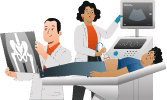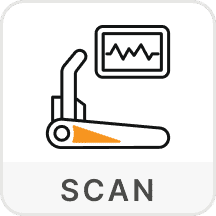near you Trusted by +
Patients Across India

Tmt (1)
FAQs
What is a TMT test?
A TMT test is a non-invasive diagnostic procedure that assesses the heart's response to physical exertion. It involves walking on a treadmill while the patient's heart rate, blood pressure, and ECG are monitored, helping to detect potential heart problems or coronary artery disease.
How long does a cardiac TMT test take?
A typical cardiac TMT test takes approximately 10 to 15 minutes in total, including preparation, the actual test, and post-test monitoring. The exercise portion of the test usually lasts between 9 and 12 minutes, depending on the individual's fitness level and the doctor's goals for the test.
Is a TMT test painful?
No, a TMT test is generally not painful. However, some patients may experience discomfort, fatigue, or shortness of breath during the exercise portion of the test. If the patient feels any severe symptoms, the test can be stopped immediately.
What can I expect during a TMT test?
During a TMT test, you will walk on a treadmill under the supervision of a doctor. The treadmill's speed and incline will gradually increase, and your heart rate, blood pressure, and ECG will be continuously monitored. If you experience any discomfort or symptoms, inform the supervisor immediately.
Is a TMT test safe?
Yes, a TMT test is generally considered safe when performed under the close supervision of qualified doctors. Although rare, potential risks may include chest pain, dizziness, or shortness of breath. These risks are minimised by constant monitoring during the test.
What does a TMT test report look like?
TMT test report includes the results and interpretation of the test, indicating whether the patient's heart receives adequate blood supply during exercise. The report will detail any changes observed in the ECG during the test and provide the radiologist's assessment of the findings.
How can I find a TMT test lab near me?
To find a TMT test lab near you, you can search online using terms such as "TMT test near me" or "echo TMT test near me." You can also consult with your doctor for recommendations, or use the locator tools provided by diagnostic centres like Apollo 24|7.
Can I book a TMT test online?
Yes, you can easily book a TMT test online through various healthcare platforms, such as Apollo 24|7. To book a TMT test online, visit the platform's website, select the test, provide the necessary information, and choose a convenient date and time for your appointment.
How should I prepare for a TMT test?
To prepare for a TMT test, wear comfortable clothing and shoes suitable for walking on a treadmill. Avoid eating a heavy meal before the test, and follow your doctor's instructions regarding any specific dietary restrictions or medication adjustments. Inform your doctor about any pre-existing health conditions or symptoms.
When will I get my TMT test report?
The turnaround time for a TMT test report may vary depending on the diagnostic centre or hospital. Usually, you can expect to receive your TMT test report within 24 to 48 hours after the test. Some centres may offer faster results or even provide the report on the same day.

